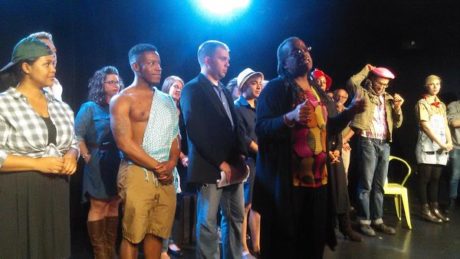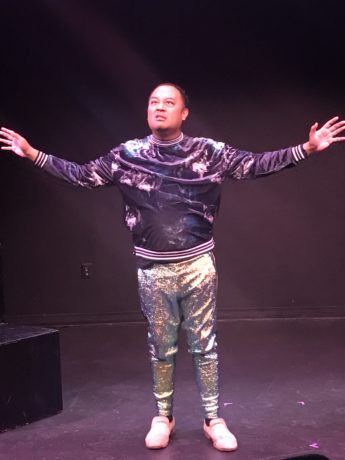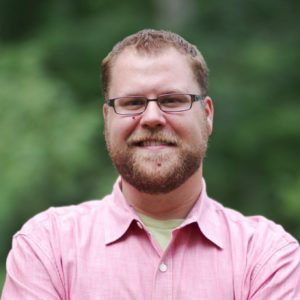Welcome to the Diverse City column on DC Theater Arts. My name is Darby DeJarnette and I created this column to highlight, through interviews, the different experiences of individuals from various social and cultural backgrounds who work in theater and the arts in the DC metro area. To share their stories shows us how much we have in common, but also helps us to appreciate and understand our differences. I hope that others may find something within the narratives of these amazing individuals that they can relate to. No one should have to feel silenced or alone.
Matt Ripa is the Founding Artistic Director of the DC Queer Theatre Festival and Board President an Artistic Ally with Ally Theatre Company. He has directed at such theatre as: Doorway Arts Ensemble, Keegan Theatre, Forum Theatre, Pinky Swear Productions, Imagination Stage, Source Festival and many others. Matt received his M.F.A. in directing from Catholic University.
I sat down with Matt to discuss his upcoming projects, his experiences, and his passions.
What does DC being a “Diverse City” mean to you?
I think one of the things I love about DC is that it’s diverse in every sense of the word: racially, ethnically, socio-economically, et cetera. It really is beautiful how diverse DC and the surrounding communities are. It challenges me as an artist. I’m forced to see my own privilege as a white, cisgender producer and director and understand that my story is not the only story that needs to be told or seen.
As a producer, it helps me provide an opportunity for those who are underrepresented in theater. I can help give them the space to tell their own stories.
What spurred the creation of the DC Queer Theatre Festival? Do you have any other projects coming up this year?

DC Queer Theatre Fest started in 2011. I’d gone out for coffee with Rebecca Welper, who was formerly a playwright in the DC area. We were talking about what we’d like to see in the DC area theater community and we both agreed that there was a need for more queer theater in the area.
Around that time, Ganymede Arts (formerly Actor’s Theatre of Washington) closed. There were some other queer theaters in the area: Brave Soul Collective, Serenity Players, and the African-American Collective Theater. There was some queer theater in town, but we were interested in developing new works with Rebecca being a playwright and with my area of expertise being in new play development.
Around that time Laura Steiner, at that time the committee chair of CenterArts at the DC Center reached out and said the Center was interested in expanding in to theater. Rebecca and I met with Alan Balch and the three of us planned the first DC Queer Theatre Festival.
That first year we were in the DC Center office. There were music stands and stools and printers and fax machines. We had to move everything to the walls and set up some chairs. We did a weekend of readings with sold out audiences. We’ve done five festivals since then.
We are currently co-producing and evening of one page plays with OutWrite (The Literary Festival at the DC Center). They did a contest for one page plays and the six winners get their plays performed. It’s a joint project with Theatre Prometheus, OutWrite, and DC Queer Theatre Fest. We’re presenting those six plays along with Regie Cabico’s solo show Faith, Hope, and Regie. Regie is reviving his show which he premiered at the last DC Queer Theatre Fest. We’re getting ready to announce submission guidelines for the 2018 festival. Hopefully, the call for submissions will go out in mid-March.
How have your personal experiences informed your work in theater?
It’s different when I’m directing versus when I’m producing. When I’m doing my “art” I bring in my personal experience all the time. It’s just who I am. I’m a collection of experiences. No matter what I’m working on I bring who I am to the rehearsal room. An important part of that is creating a safe space.
In my casting, I try to encourage diversity. Not just LGBTQ+ but also racial and ethnic diversity. That’s how it affects my directing.
As far as producing goes, I am always drawn to stories that I have a connection with on some level. Many of those stories are queer stories.

Are there issues facing the LGBTQ+ community that you feel need to be addressed in theater?
We’re seeing more theater that addresses the oppression felt by the transgender and nonbinary community. I think that’s an issue that is playing out a lot in theater. I’d like to see the casting of more transgender actors, not just in roles that are transgender characters. On the other hand, it’s important when you have a character that is transgender or nonbinary that theaters try to cast people from that community in those roles. We have issues of erasure and we need to be willing to work against that.
I also think the Black Lives Matter movement is having an impact on most communities. There was an organization called No Justice No Pride this past year that had taken issue with Pride because of the corporate sponsorship and police involvement with Pride. I think these are issues that surpass the LGBTQ+ community. It’s time for the queer community to look at ourselves and at the privilege that a lot of members of our community have that others may not. People are suffering. The suicide rate is high, as is the rate of murder of transwomen of color. These are things the queer community needs to grapple with and, in turn, that the theater community needs to grapple with.
What would you like to see happen in/with the queer theater community and the DC theater community in the future?
Representation. Making sure casting is diverse and making sure all kinds of queer people are included, not just as actors, but also in leadership roles. Once we start to see diversity in leadership and in who is creating theater, we will start to see parity in the stories being told and the casting.
From Elena Velasco (AD of Convergence Theatre): How do you plan to mobilize your audiences to make change in our community?
All of the money for DC Queer Theatre Fest goes back in to the DC Center. With the audience knowing that their money is going to provide the essential services that the DC Center provides is important. I’d like our audiences to get involved. We don’t really do “political” theater. Our festival changes every year, but we’re really focusing on the local community.
I think a lot of what we do is shedding light on stories that haven’t been told. If an audience member leaves aware of a struggle that they didn’t know existed, then we have succeeded in a way.
When I hear the word “mobilize” I think of going out and writing letters, calling congress, or taking to the streets or something similar. It’s a very Brechtian idea of theater: that theater has the power to move people to action— and I believe it does, but does the theater have the action ready? If people leave the theater ready to fight back, does the theater have the resources to mobilize them.
Can you give me a question that you would like me to pose, from you, to the next person I interview?
Sure. My question would be: Where do you draw the lines in the types of roles that you accept? I think we tend to believe that the actor is the least powerful person in the room. As a director, I try to break that wall and give actors agency in the rehearsal room. We often think of producers and directors as leading that charge— and the actor just gets called in to do the work. How do you find agency in a rehearsal room where you may be silenced by a director or producer?
—
You can learn more about the DC Queer Theatre Festival online.





